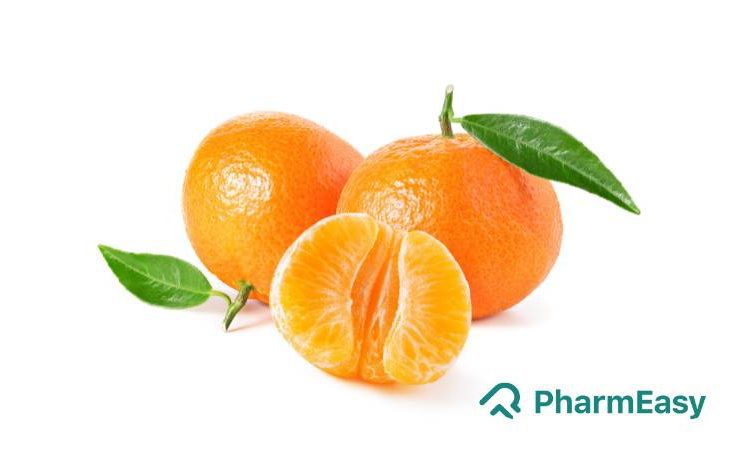Tangerine: Uses, Benefits & Side Effects
By Dr. Nikita Toshi +2 more

Get,

to manage your symptom
Get your,


4 Cr+ families
benefitted

OTP sent to 9988776655



You’ve successfully subscribed to receive
doctor-approved tips on
Whatsapp

Get ready to feel your best.

Hi There,
Download the PharmEasy App now!!


Register to Avail the Offer
Send OTPBy continuing, you agree with our Privacy Policy and Terms and Conditions

Hi There,
Sign up on PharmEasy now!!
Trusted by 4 crore+ families

OTP sent to 9988776655



You have unlocked 25% off on medicines




Code: NU25
By Dr. Nikita Toshi +2 more
Table of Contents
The mandarin orange species of the family Rutaceae includes the small, thin-skinned form of orange known as the tangerine (Citrus reticulata). Tangerine culture originated in Southeast Asia and travelled west through trade routes all the way to the Mediterranean1. The fruit is grown in both the Old World and the New World’s subtropical regions, mainly southern Europe and the southern United States. The pulp is soft, juicy and flavorful with plenty of vitamin C. Many flavourings and liqueurs use the oil derived from the tangerine’s fragrant skin as a distinctive ingredient.
A medium-sized tangerine with a diameter of around 2/12 inches weighs roughly 88 gm and contains the following2:

Tangerines provide the following health advantages:
Tangerines are a great source of dietary fibre for people and are packed with vitamin C.

Tangerines and their peels are abundant in flavonoids and vitamin C, two antioxidants that guard against a wide range of ailments3. By counteracting the harmful effects of oxidative stress, which is brought on by the buildup of free radicals, antioxidants defend your body against damage. These hazardous compounds contribute to the emergence of chronic diseases like cancer, arthritis and heart disease.
Tangerine is one of the citrus fruits like oranges, lemons, and grapefruits. Much like other members of its family, it is high in vitamin C. Vitamin C is a powerful antioxidant and might be beneficial for eye health. Thus, including citrus fruits in your diet regularly is highly recommended6.
Dr. Siddharth Gupta, B.A.M.S, M.D (Ayu)

Tangerine excellent status as a food high in antioxidants is one of the best things about tangerine fruit. Antioxidants are potent substances that work to counteract the harm done to the body by free radicals, lowering the risk of inflammation and chronic diseases like cancer, diabetes and heart disease. According to research4, tangerines are a great source of naringin, naringenin, nobiletin, narirutin and hesperidin, as well as other antioxidant components. Moreover, tangerines contain a lot of vitamin C, a water-soluble vitamin that functions as an antioxidant to shield cells from oxidative damage.

According to experts, persons with type 2 diabetes may benefit from the antioxidants found in citrus fruits like tangerines. Researchers of a study5 noted in a publication that people with type 2 diabetes have decreased levels of antioxidant vitamins and enzymes. Patients with type 2 diabetes and other inflammatory disorders may experience less oxidative stress by consuming antioxidant-rich fruits like tangerines or fruit extracts.

The high vitamin C concentration of tangerines, which delivers more than 25% of your daily needs in just one fruit, is responsible for the majority of your health advantages. In addition to aiding in the absorption of iron and warding off infections, vitamin C is a strong antioxidant that protects your cells from stress-related cellular damage and ageing.
Based on some studies7, Tangerine might aid in the improvement of sleep quality, mood enhancement and cognitive functions.
Dr. Rajeev Singh, BAMS
Tangerines is a juicy fruit with tremendous health benefits. They can be used as
Tangerines can be combined with chocolate and walnuts for a refreshing take on summer cakes. They are delicious and can be eaten as a dessert on sultry summer afternoons. Tangerines can also be coated or dipped in melted chocolate to make a sweet snack for kids. Tangerines also go really well with caramels, marshmallows and other sweet ingredients. Meat products like spiced ham can be marinated using the tangerine sauce for a juicy and refreshing flavour.
Also Read: 15 Amazing Benefits of Poppy Seeds (Khus Khus)
Despite the fact that tangerines are extremely healthy and advantageous, it is advisable to consume them in moderation. Tangerines have reportedly caused allergy reactions in some people under specific circumstances. Hence, inform your healthcare practitioner right away if you develop any of these side effects or any adverse responses after eating tangerines.
Also Read: Custard Apple: Uses, Benefits, Side Effects and More!
Abdominal pains and diarrhoea are two gastrointestinal problems that may result from overeating tangerines. They might also conflict with liver-related drugs. Despite being nutritious, eating more tangerines than advised could be harmful to your health. Before consuming tangerines, check with your doctor if you are taking medicine for your liver.
Also Read: Kulthi Dal: Uses, Benefits, Side Effects & More!
Oranges and tangerines are both fruits that belong to the citrus family. However, they are not the same. While oranges might provide more vitamin C and fibre per serving, tangerines seem to be a richer source of vitamin A. Although tangerines tend to be more reddish-orange than most orange varieties, they share a similar hue. Compared to tangerines, oranges are bigger and rounder. Either kind may have seeds or not. Tangerines are more reddish-orange than most orange kinds, which are typically yellowish-orange.
Tangerines have few calories and no fat, but they are a great source of fibre, vitamins and minerals. An average-sized tangerine has 50 calories and 13 grams of carbohydrates, 9 grams of which are natural sugars. Just under 50% of your daily vitamin C needs and approximately 10% of your daily fibre requirements are provided by one tangerine.
Tangerines have high levels of vitamin C, a powerful antioxidant that fights free radical damage and reduces inflammation. Tangerines allow your body to absorb iron from your diet. They can aid in the healing of small wounds and cuts. Pectin and hemicellulose, two fibres found in tangerines, limit the absorption of cholesterol in the intestine and reduce the risk of obesity. Tangerines’ fibre helps with constipation and enhances digestion. Vitamin A, which is abundant in tangerines and aids in tissue repair, may also lessen the appearance of age-related signs of ageing such as fine lines, wrinkles and dull skin.
In ancient native China and Japan, mandarins have been grown for more than three thousand years. They were given that name because orange-robed Chinese aristocrats wore them. The fruit was first transported to Europe and the Americas in the 1800s through Tangiers in Morocco, hence the name of the fruit.
Tangerines and oranges come in a variety of flavours, although each fruit’s flavour is mostly influenced by its type. Oranges and tangerines both come in sweet and sour varieties. The majority of tangerines, however, are sweeter and less tart than oranges. Additionally, tangerines typically have a shorter aftertaste and a more robust flavour profile than oranges.
1. Mabberley DJ. Citrus (Rutaceae): a review of recent advances in etymology, systematics and medical applications. Blumea. 2004;49(2‑3):481–498. doi:10.3767/000651904X484432. Available from: https://www.researchgate.net/publication/233545464_Citrus_Rutaceae_A_Review_of_Recent_Advances_in_Etymology_Systematics_and_Medical_Applications
2. U.S. Food and Drug Administration. Raw Fruits Poster — Fruits Nutrition Facts (Raw, Edible Weight Portion). Raw Fruits Poster (Text Version / Accessible Version) [Internet]. [cited 2025 Dec 04]. Available from: https://www.fda.gov/food/nutrition-food-labeling-and-critical-foods/raw-fruits-poster-text-version-accessible-version
3. Shi M, Guo Q, Xiao Z, Sarengaowa, Xiao Y, Feng K. Recent Advances in the Health Benefits and Application of Tangerine Peel (Citri Reticulatae Pericarpium): A Review. Foods. 2024 Jun 23;13(13):1978. doi: 10.3390/foods13131978. PMID: 38998484; PMCID: PMC11241192. Available from: https://pmc.ncbi.nlm.nih.gov/articles/PMC11241192/
4. Alam MA, Subhan N, Rahman MM, Uddin SJ, Reza HM, Sarker SD. Effect of citrus flavonoids, naringin and naringenin, on metabolic syndrome and their mechanisms of action. Adv Nutr. 2014 Jul 14;5(4):404-17. doi: 10.3945/an.113.005603. PMID: 25022990; PMCID: PMC4085189. Available from: https://pmc.ncbi.nlm.nih.gov/articles/PMC4085189/
5. Visvanathan R, Williamson G. Effect of citrus fruit and juice consumption on risk of developing type 2 diabetes: Evidence on polyphenols from epidemiological and intervention studies. Trends in Food Science & Technology. 2021;115:133‑146. doi:10.1016/j.tifs.2021.06.038. Available from: https://www.sciencedirect.com/science/article/pii/S092422442100412X
6. American Academy of Ophthalmology. Four Fantastic Foods to Keep Your Eyes Healthy. AAO Eye Health News [Internet]. 2012 May 03 [cited 2025 Dec 04]. Available from: https://www.aao.org/eye-health/news/four-fantastic-foods
7. Chandharakool S, Koomhin P, Sinlapasorn J, Suanjan S, Phungsai J, Suttipromma N, Songsamoe S, Matan N, Sattayakhom A. Effects of Tangerine Essential Oil on Brain Waves, Moods, and Sleep Onset Latency. Molecules. 2020 Oct 21;25(20):4865. doi: 10.3390/molecules25204865. PMID: 33096890; PMCID: PMC7587980. Available from: https://pmc.ncbi.nlm.nih.gov/articles/PMC7587980/
Disclaimer: The information provided here is for educational/awareness purposes only and is not intended to be a substitute for medical treatment by a healthcare professional and should not be relied upon to diagnose or treat any medical condition. The reader should consult a registered medical practitioner to determine the appropriateness of the information and before consuming any medication. PharmEasy does not provide any guarantee or warranty (express or implied) regarding the accuracy, adequacy, completeness, legality, reliability or usefulness of the information; and disclaims any liability arising thereof.
Links and product recommendations in the information provided here are advertisements of third-party products available on the website. PharmEasy does not make any representation on the accuracy or suitability of such products/services. Advertisements do not influence the editorial decisions or content. The information in this blog is subject to change without notice. The authors and administrators reserve the right to modify, add, or remove content without notification. It is your responsibility to review this disclaimer regularly for any changes.
Comments

Leave your comment...
You may also like
Comments